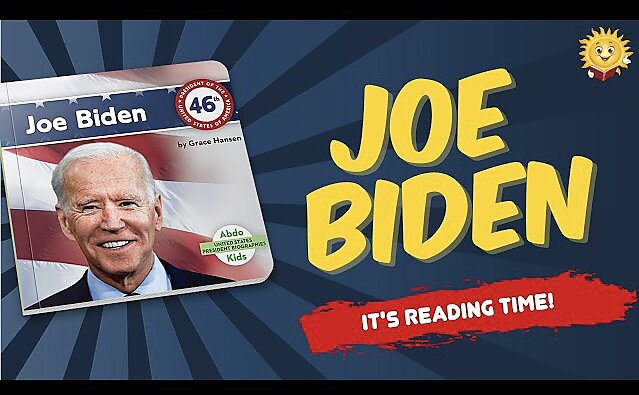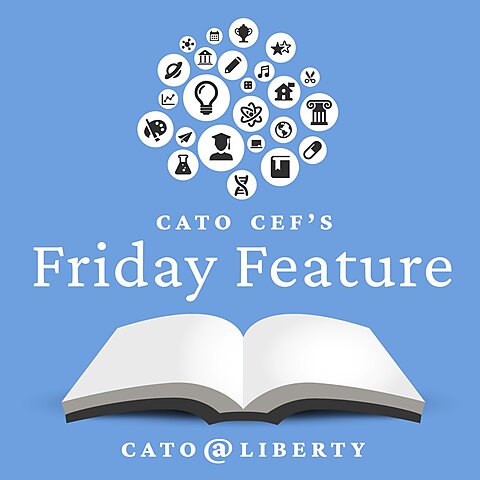
Biden’s New Federal Czar for the Middle‐School Library
“The library looms as the next big confrontation in the culture war,” the Atlantic reports, and President Biden, our Culture‐Warrior‐in‐Chief, is itching for the fight. “The president signaled a new approach in his late‐April announcement video, when he cited book bans as evidence for his accusation that Republicans in the Donald Trump era are targeting Americans’ ‘personal freedom.’”
Not today, Satan—not on Joe Biden’s watch. “We’re taking on these civil rights violations, because that’s what they are,” Biden told the crowd at the White House Pride Celebration in June: “book bans may violate the federal civil rights laws when they target LGBTQ students or students of color and create hostile classroom environments.”
When that happens, local school districts will face the wrath of the new federal Czar of the Middle‐School Library. “Students have a right to learn free from discrimination,” the president’s top domestic policy advisor, Neera Tanden, explains, but “across the country, our nation faces a dangerous spike in book bans [targeting] LGBTQI+ communities.” Accordingly, the administration is appointing a new “coordinator” in the Department of Education’s Office for Civil Rights who’ll bring the full force of the federal government to bear in this fight.
I wrote recently that Biden’s new Title IX edicts make him “Commander‐in‐Chief of the Girls’ Room”; with this latest move, he can add “Boss of the Bookmobile” to his collection of extraconstitutional titles. It’s an absurd power‐grab based on the flimsiest of pretexts—and it’s certain to make America’s cultural conflicts worse.
The White House, like much of the press, has been cagey and duplicitious when it comes to what the “book‐banning” controversy is really about. In Biden’s reelection video, for example, while the president rails against “MAGA extremists… banning books,” the camera shows a stack of titles including Ralph Ellison’s Invisible Man and Harper Lee’s To Kill a Mockingbird.
Atticus Finch in the dock? Maybe in a few notorious MAGA strongholds like, er, Los Angeles and Seattle, where Lee’s novel has been pulled from the curriculum for its insensitive “white‐savior” storyline. But the real school‐library fight centers on a quite different class of books.
In both the PEN America and American Library Association “most banned” lists, number one by a wide margin is Maia Kobabe’s Gender Queer, a “graphic novel” that’s decidedly Not Safe For Work and—arguably!—inappropriate for a grammar‐school library.
Others in the ALA’s top 10 include:
All Boys Aren’t Blue (#2), (depictions of underage cousin‐incest)
Lawn Boy (#7), “which describes 10‐year‐old boys performing oral sex on each other”; and
This Book Is Gay (#10), which includes advice on mutual masturbation—“something they don’t teach you in school”(!)—and “instructions on how to use Grindr to find sex partners.”)
The ACLU and former president Barack Obama have recently encouraged public‐spirited Americans to start Banned Books clubs. I’d love to see the face of any earnest suburban liberal who signs up expecting a refresher course in Vonnegut and Steinbeck. In any event, if you’d like a clearer picture of what some parents are objecting to, in their new study, “The Book Ban Mirage,” AEI’s Max Eden and Heritage’s Jay P. Greene and Madison Marino helpfully screenshot many of the offending passages.
As for the supposed “dangerous spike in book bans,” Eden, Greene, and Marino show that activists are playing fast and loose with the term “banned.” PEN America’s definition is broad enough to include “any action taken against a book” that leads to “restricted” or “diminished” access for any period of time. Temporarily removed then reshelved after review? “Banned.” Moved from the middle‐school library to the high‐school shelves? “Banned.” Removed from a recommended reading list but still on the library shelves? “Banned.”
In fact, when Eden et al. decided to check online school library catalogs against the PEN index of “banned” books, they found that:
“74 percent of the books that PEN America lists as banned are listed as available in the same districts from which PEN America says those books were banned.”
Still, the authors managed to find a few localities where kids can no longer check out some of the spicier tomes on PEN’s List. So what? There are over 13,000 school districts in the United States; are we supposed to think Our Democracy is imperiled because a couple dozen of them took Gender Queer off their library shelves?
Reports of a wave of book‐banning Babbittry have been greatly exaggerated. But to be fair to PEN America, the organization does document some serious cases of legislative overreach by Red‐state politicians claiming to speak for concerned parents. Last year, for example, Missouri made it a misdemeanor offense, carrying possible jail time, for librarians to provide “explicit sexual material” to students. That’s nutty: decisions about what goes on school‐library shelves should be made at the local level, not forcibly dictated from the state house.
Still less should those decisions be dictated from Washington, D.C.: if the taxpayers in a local school district don’t want Gender Queer or This Book Is Gay in their kids’ library, it’s none of Joe Biden’s business.
That’s not how Biden sees things, unfortunately; in the president’s view, it’s his right and duty to make a federal case out of how school libraries stock their shelves.
In January, according to the Washington Post, the Biden administration embarked on its “first test of a new legal argument that failing to represent students in school books can constitute discrimination.”
In early 2022, the Granbury Independent School District in North Texas removed multiple LGBTQ‐focused books from its libraries for review, ultimately deciding to return most of them to the shelves. Only three books, including This Book Is Gay (the one “that teaches kids about anal sex, oral sex, and hookup apps”), were permanently removed. The ACLU hit back with a federal civil rights complaint charging that the district had “actively facilitated discrimination and hateful rhetoric” in violation of Title IX. As the Post noted:
“If the government finds in the ACLU’s favor, the determination could have implications for schools nationwide, experts said, forcing libraries to stock more books about LGBTQ individuals and… ensur[e] student access to books that some Americans, especially right‐leaning parents, deem unacceptable.
The Granbury investigation is still in progress, but in May, OCR reached a settlement in a similar case involving a suburban Atlanta school system. Here, the Biden administration advanced the novel theory that, even if the school district itself doesn’t discriminate, it can be held accountable for a “hostile environment” created by parents’ comments at a school board meeting.
The Forsyth County School District’s trouble started in January 2022, when it temporarily removed eight books following parent complaints. After review, they returned seven of eight to the library shelves, excluding only one, the aforementioned All Boys Aren’t Blue. FCS soon found itself subject to a federal civil rights investigation into whether the removal of those books created a “racially and sexually hostile environment for students.”
In its May 19 letter announcing the resolution of that case, the Office for Civil Rights admits that Forsyth County wasn’t engaged in an anti‐gay book purge: it had “limited its book screening process to sexually explicit material.” “Nonetheless,” OCR chides, “communications at board meetings conveyed the impression that books were being screened to exclude diverse authors and characters, including people who are LGBTQI+ and authors who are not white, leading to increased fears and possibly harassment.” OCR found it troubling that during a February 15 board meeting:
“some [parents’] comments focused on removing books for reasons related to gender identity or sexual orientation. Also some parents made negative comments about diversity and inclusion or critical race theory.”
The OCR letter doesn’t specify what those comments were, but according to press coverage of the Board meeting, they included statements like
“Do you think it’s healthy for 8‑year‐olds to be exposed to books which encourage transgenderism, sexualization and masturbation?”
and
“CRT, DEI, SEL, or any other name you give it is not harmless…. No more lies, such as ‘DEI’s purpose is to teach children that there are different cultures that eat different foods. Really?”
Scandalous wrongthink—and in the presence of children, no less! According to OCR, parents’ statements at the board meeting contributed to a potential “racially and sexually hostile environment,” which the district failed to adequately address with “supportive measures” for afflicted students.
To get the feds off their back, Forsyth County Schools had to agree to a number of humiliating terms. Per the Resolution Agreement, FCS must:
Publicly Pledge Fealty to DEI Thought: “in locations readily available to the District’s middle and high school students,” FCS shall post a statement affirming that “the District strives to provide a global perspective and promote diversity by including in school libraries materials about and by authors and illustrators of all cultures”;
Help Aggrieved Students Sic the Feds on Their School: that statement will also provide “any student who feels impacted by the environment surrounding the removal of books” with “information about how to file a complaint about discrimination or harassment” under Title IX and Title VI;
Take a Long, Hard Look in the Mirror: “The District will administer a school climate survey” on the prevalence of book‐related and other harassment in its middle and high schools; and “assess whether any additional student or other training is needed to further improve the climate.” Look, this is a wealthy school district with plenty of tax dollars to go around: why shouldn’t the DEI‐consultant industry get a taste?
…all this because school officials took a book featuring underage cousin‐incest off their middle‐school library shelves.
As the Foundation for Individual Rights and Expression notes, OCR’s strong‐arm tactics succeeded here despite the fact that
“there is no legal authority that [says] failure to ‘promote diversity’ violates federal anti‐discrimination law. If OCR thinks it can require schools to affirmatively ‘promote diversity’— a term left undefined — what else does the agency think it can get away with?”
I suppose we’ll find out as Biden’s new school‐library czar gets to work.



